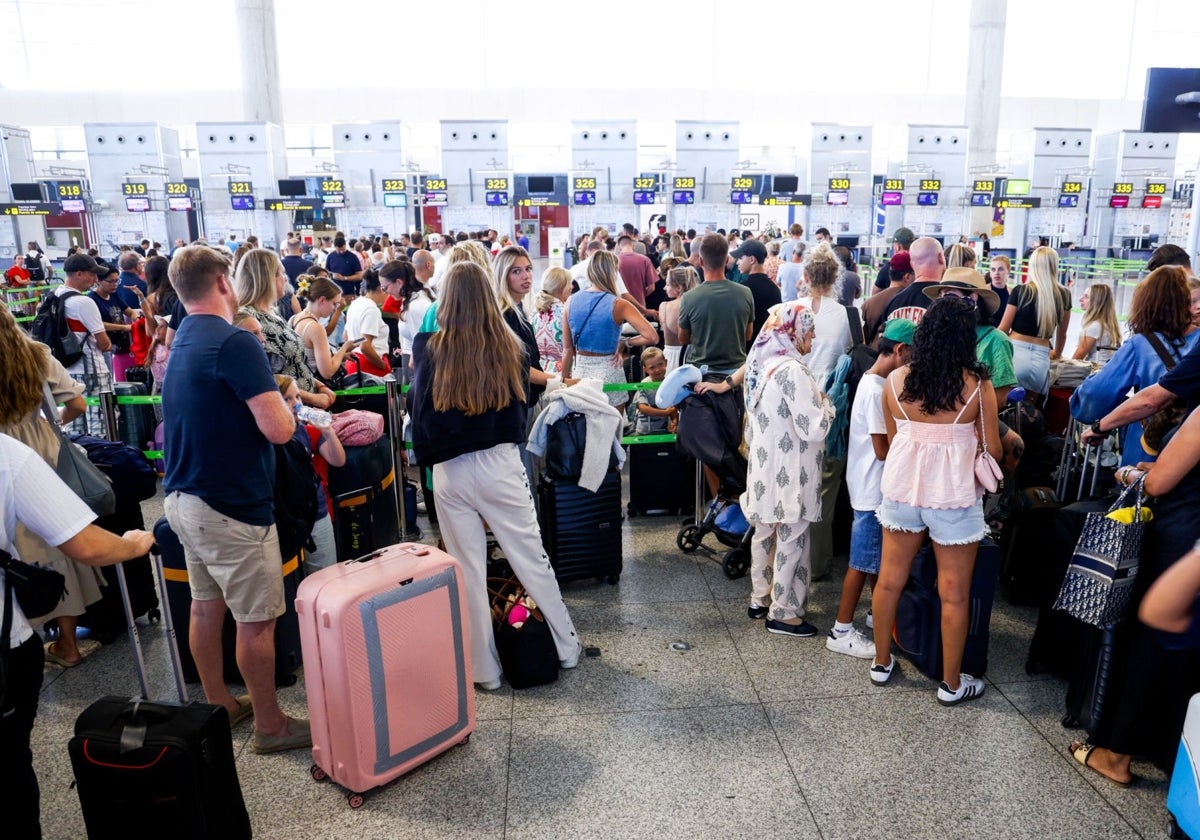Flight delays, overbooking, travelling with children and baggage problems: What are your rights when things go wrong at the airport?
European regulations protect passengers in many situations and these are the rights you have to ensure that your journey arrangements are not spoiled
These are some of the busiest days at airports across Spain. It is also a time when there is an increased likelihood of unforeseen circumstances before, during or after flights, such as delays, airlines overbooking or surprises when travelling as a family with small children. Considering this increased risk of disruptions, it is a good idea to learn the lesson and know exactly how to act and what rights protect passengers under this type of circumstance.
The AirHelp platform - a travel technology company that works to improve the experience of air passengers during a flight disruption - says that in the first half of the year alone, around 5,415,000 people took a flight from Malaga Airport. Of these, 75.5% arrived at their destination on time and 24.5% experienced delays or cancellations, with delays ranging from 15 minutes to three hours. The same company estimates that around 57,500 passengers are entitled to financial compensation for having suffered cancellations or delays of more than three hours, which is part of the requirements established by European regulations.
However, at a time when travel is becoming more budget-conscious, there is an increasing demand for connecting flights as they are often a more economical option. The problem is that the chances of missing a connection also increase. For this reason, it is important to know when you are entitled to compensation in order to travel with peace of mind and face the challenges, such as the risk of missing a connection due to delays, baggage handling or simply not knowing your rights.
According to AirCashBack, there is an essential difference between buying a trip as a single booking or purchasing tickets separately, as the airline's liability changes completely.
The most critical point for a journey with a stopover is the way in which the tickets are purchased. If all legs are booked together in a single reservation, the airline is responsible for the entire journey. This means that if a delay on the first flight causes the second flight to be missed, the airline is obliged to provide an alternative flight free of charge and to provide assistance with food, drink and accommodation if necessary. Regulation (EC) No 261/2004 stipulates that if a passenger arrives at their final destination with a delay of three hours or more, they are entitled to financial compensation of up to 600 euros. However, if tickets are purchased separately, each flight is a separate contract and the second leg airline has no obligation if the passenger does not show up on time.
Another key aspect is baggage. In a single booking, the checked bag is usually tagged until the final destination, so the passenger does not have to pick it up at the stopover. The only exceptions are usually countries such as the US or Canada, which require a customs check. If tickets are separate, luggage must be collected and checked in again, for which a minimum of three to four hours between flights is recommended.
Compensations for overbooking
One of the aspects of travelling that most shocks passengers is when they get to the gate and the airline workers tell them that the flight has been 'overbooked' and they cannot get on the plane, despite having bought a ticket. This is one of the most frustrating situations for air passengers. Airlines use this practice to sell more tickets than seats available in order to maximise the occupancy of their flights and reduce losses due to empty seats, usually caused by last-minute cancellations or no-show passengers. Although legal, this practice can cause significant problems for passengers, especially when the estimates fail and more people than expected show up for boarding. If denied boarding is against a passenger's will, they can claim financial compensation and assistance, as set out in the European regulation EC 261, with compensation of up to 600 euros depending on the distance of the flight.
Rosa García - legal advisor at AirHelp - warns that European regulations protect air passengers who are affected by an involuntarily denied boarding. In such cases, airlines are obliged to pay financial compensation of 250 euros for flights up to 1,500 kilometres; 400 euros for flights within the EU over 1,500 kilometres and for other flights between 1,500 and 3,500 kilometres; and 600 euros for flights over 3,500 kilometres.
García said that in case the company offers an alternative transport with a similar arrival time, the compensation can be reduced to 50%. In addition, the airline is obliged to provide care and assistance: food and drink according to the waiting time, accommodation if necessary, transport between airport and hotel and two free telephone or email communications. It must also offer either a refund of the ticket price within a maximum of seven days or rebooking on the first available flight, or on a later date convenient for the passenger.
However, where the passenger voluntarily agrees to give up their seat in exchange for benefits, the financial compensation provided for in EC 261 does not apply and the conditions are negotiated directly with the airline.
Travelling as a family
When travelling with children, parents should know that any child under the age of 12 must be seated next to an accompanying adult, which, unlike choosing a seat for anybody over the age of 12, is free of charge. Airhelp insists that "airlines cannot charge for this right or separate a child for not having paid for seat selection". In addition, if you are travelling with babies, you should know that you have the right to bring a stroller and a car seat at no extra cost and to carry milk or baby food in the cabin, even in quantities of more than 100 millilitres. "It is now very common for airlines to offer priority boarding and special assistance at airports for families with small children. On the other hand, it is essential for each child to carry their own passport or national identity card. If they are travelling with only one parent, it is recommended to carry a signed letter of consent," the company says.
As for lost or delayed baggage, AirHelp reminds families that they can request reimbursement for essential products such as clothes, nappies or baby milk. In these cases, compensation can be up to 1,300 euros according to the Montreal convention and it is essential to file a formal claim within the established deadlines - seven days for damage and 21 days for delay.


Comentar es una ventaja exclusiva para registrados
¿Ya eres registrado?
Inicia sesiónNecesitas ser suscriptor para poder responder.
Necesitas ser suscriptor para poder votar.